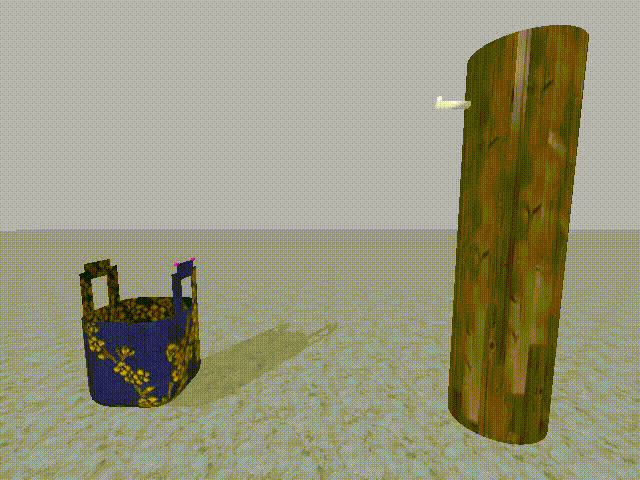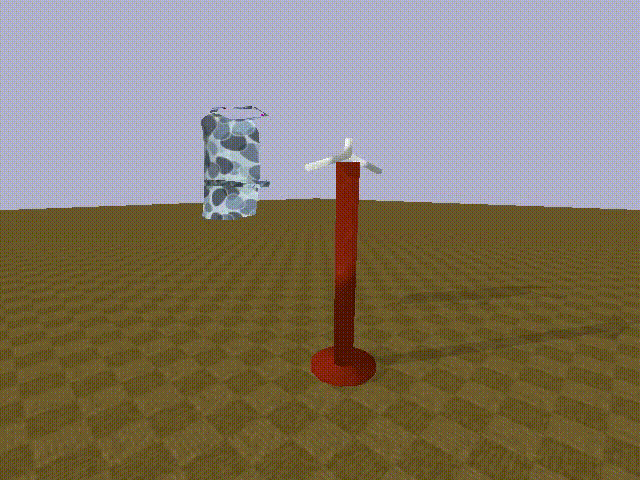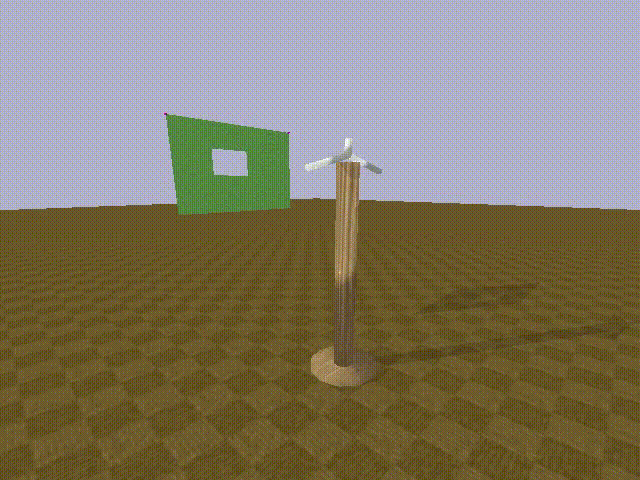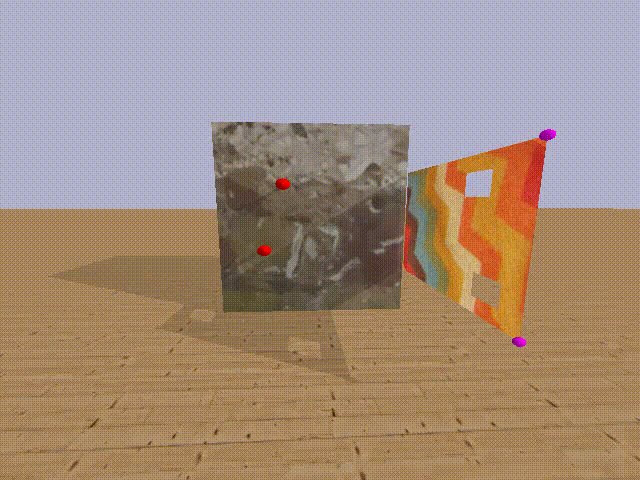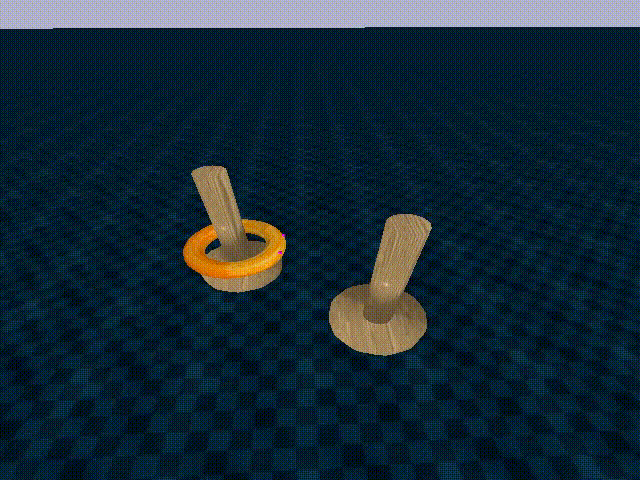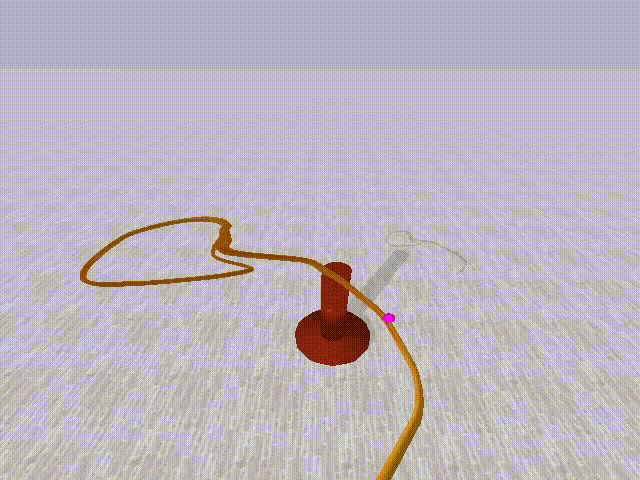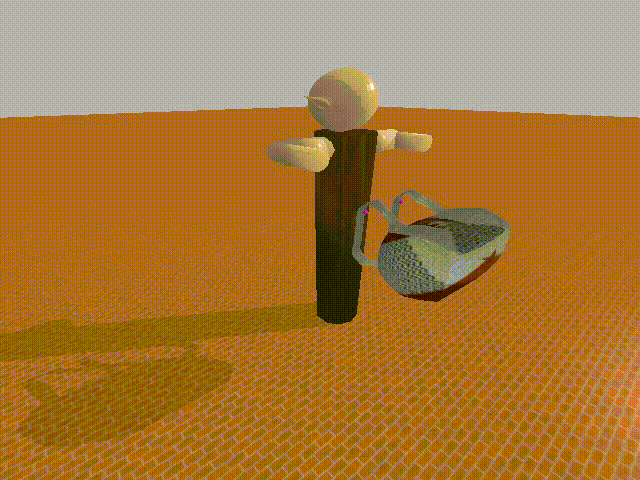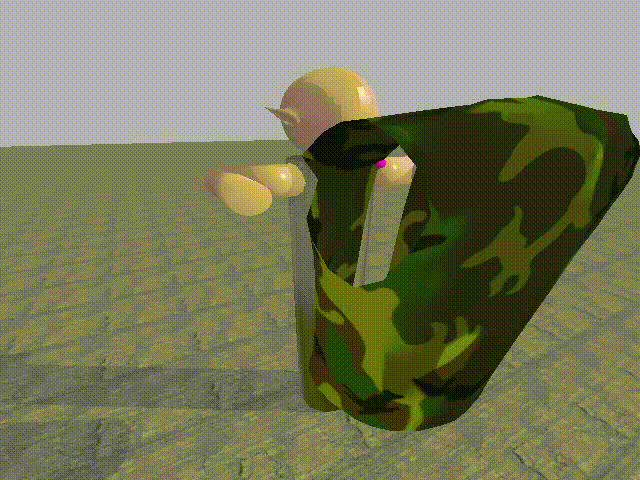DEDO is a lightweight and customizable suite of environments with deformable objects. It is aimed for researchers in the machine learning, reinforcement learning, robotics and computer vision communities. The suite provides a set of every day tasks that involve deformables, such as hanging cloth, dressing a person, and buttoning buttons. We provide examples for integrating two popular reinforcement learning libraries: StableBaselines3 and RLlib. We also provide reference implementaionts for training a various Variational Autoencoder variants with our environment. DEDO is easy to set up and has few dependencies, it is highly parallelizable and supports a wide range of customizations: loading custom objects and textures, adjusting material properties.
Note: updates for this repo are in progress (until the presentation at NeurIPS2021 in mid-December).
@inproceedings{dedo2021,
title={Dynamic Environments with Deformable Objects},
author={Rika Antonova and Peiyang Shi and Hang Yin and Zehang Weng and Danica Kragic},
booktitle={Conference on Neural Information Processing Systems (NeurIPS) Datasets and Benchmarks Track},
year={2021},
}
Table of Contents:
Installation
GettingStarted
Tasks
Use with RL
Use with VAE
Customization
Please refer to Wiki for the full documentation
Optional initial step: create a new conda environment with
conda create --name dedo python=3.7 and activate it with
conda activate dedo.
Conda is not strictly needed, alternatives like virtualenv can be used;
a direct install without using virtual environments is ok as well.
git clone https://github.com/contactrika/dedo
cd dedo
pip install numpy # important: Nessasary for compiling numpy-enabled PyBullet
pip install -e .
Python3.7 is recommended as we have encountered that on some OS + CPU combo, PyBullet could not be compiled with Numpy enabled in Pip Python 3.8. To enable recording/logging videos install ffmpeg:
sudo apt-get install ffmpeg
See more in Installation Guide in wiki
To get started, one can run one of the following commands to visualize the tasks through a hard-coded policy.
python -m dedo.demo --env=HangGarment-v1 --viz --debug
dedo.demois the demo module--env=HangGarment-v1specifies the environment--vizenables the GUI---debugoutputs additional information in the console--cam_resolution 400specifies the size of the output window
See more in Usage-guide
See more in Task Overview
We provide a set of 10 tasks involving deformable objects, most tasks contains 5 handmade deformable objects.
There are also two procedurally generated tasks, ButtonProc and HangProcCloth, in which the deformable objects are procedurally generated.
Furthermore, to improve generalzation, the v0 of each task will randomizes textures and meshes.
All tasks have -v1 and -v2 with a particular choice of meshes and textures
that is not randomized. Most tasks have versions up to -v5 with additional
mesh and texture variations.
Tasks with procedurally generated cloth (ButtonProc and HangProcCloth)
generate random cloth objects for all versions (but randomize textures only
in v0).
python -m dedo.demo_preset --env=HangBag-v1 --viz
HangBag-v0: selects one of 108 bag meshes; randomized textures
HangBag-v[1-3]: three bag versions with textures shown below:
python -m dedo.demo_preset --env=HangGarment-v1 --viz
HangGarment-v0: hang garment with randomized textures
(a few examples below):
HangGarment-v[1-5]: 5 apron meshes and texture combos shown below:
HangGarment-v[6-10]: 5 shirt meshes and texture combos shown below:
python -m dedo.demo_preset --env=HangProcCloth-v1 --viz
HangProcCloth-v0: random textures,
procedurally generated cloth with 1 and 2 holes.
HangProcCloth-v[1-2]: same, but with either 1 or 2 holes
python -m dedo.demo_preset --env=Button-v1 --viz
ButtonProc-v0: randomized textures and procedurally generated cloth with
2 holes, randomized hole/button positions.
ButtonProc-v[1-2]: procedurally generated cloth, 1 or two holes.
Button-v0: randomized textures, but fixed cloth and button positions.
Button-v1: fixed cloth and button positions with one texture
(see image below):
python -m dedo.demo_preset --env=Hoop-v1 --viz
Hoop-v0: randomized textures
Hoop-v1: pre-selected textures

python -m dedo.demo_preset --env=Lasso-v1 --viz
Lasso-v0: randomized textures
Lasso-v1: pre-selected textures
python -m dedo.demo_preset --env=DressBag-v1 --viz
DressBag-v0, DressBag-v[1-5]: demo for -v1 shown below
Visualizations of the 5 backpack mesh and texture variants for DressBag-v[1-5]:
python -m dedo.demo_preset --env=DressGarment-v1 --viz
DressGarment-v0, DressGarment-v[1-5]: demo for -v1 shown below
python -m dedo.demo_preset --env=Mask-v1 --viz
Mask-v0, Mask-v[1-5]: a few texture variants shown below:

dedo/run_rl_sb3.py gives an example of how to train an RL
algorithm from Stable Baselines 3:
python -m dedo.run_rl_sb3 --env=HangGarment-v0 \
--logdir=/tmp/dedo --num_play_runs=3 --viz --debug
dedo/run_rllib.py gives an example of how to train an RL
algorithm using RLLib:
python -m dedo.run_rllib --env=HangGarment-v0 \
--logdir=/tmp/dedo --num_play_runs=3 --viz --debug
For documentation, please refer to Arguments Reference page in wiki
To launch the Tensorboard:
tensorboard --logdir=/tmp/dedo --bind_all --port 6006 \
--samples_per_plugin images=1000
dedo/run_svae.py gives an example of how to train various flavors of VAE:
python -m dedo.run_rl_sb3 --env=HangGarment-v0 \
--logdir=/tmp/dedo --num_play_runs=3 --viz --debug
dedo/run_rllib.py gives an example of how to train an RL
algorithm from Stable Baselines 3:
python -m dedo.run_rl_sb3 --env=HangGarment-v0 \
--logdir=/tmp/dedo --num_play_runs=3 --viz --debug
To launch the Tensorboard:
tensorboard --logdir=/tmp/dedo --bind_all --port 6006 \
--samples_per_plugin images=1000
To load custom object you would first have to fill an entry in DEFORM_INFO in
task_info.py. The key should the the .obj file path relative to data/:
DEFORM_INFO = {
...
# An example of info for a custom item.
'bags/custom.obj': {
'deform_init_pos': [0, 0.47, 0.47],
'deform_init_ori': [np.pi/2, 0, 0],
'deform_scale': 0.1,
'deform_elastic_stiffness': 1.0,
'deform_bending_stiffness': 1.0,
'deform_true_loop_vertices': [
[0, 1, 2, 3] # placeholder, since we don't know the true loops
]
},
Then you can use --override_deform_obj flag:
python -m dedo.demo --env=HangBag-v0 --cam_resolution 200 --viz --debug \
--override_deform_obj bags/custom.obj
For items not in DEFORM_DICT you will need to specify sensible defaults,
for example:
python -m dedo.demo --env=HangGarment-v0 --viz --debug \
--override_deform_obj=generated_cloth/generated_cloth.obj \
--deform_init_pos 0.02 0.41 0.63 --deform_init_ori 0 0 1.5708
Example of scaling up the custom mesh objects:
python -m dedo.demo --env=HangGarment-v0 --viz --debug \
--override_deform_obj=generated_cloth/generated_cloth.obj \
--deform_init_pos 0.02 0.41 0.55 --deform_init_ori 0 0 1.5708 \
--deform_scale 2.0 --anchor_init_pos -0.10 0.40 0.70 \
--other_anchor_init_pos 0.10 0.40 0.70
See more in Customization Wiki
BGarment dataset is adapter from Berkeley Garment Library
Sewing dataset is adapted from Generating Datasets of 3D Garments with Sewing Patterns

